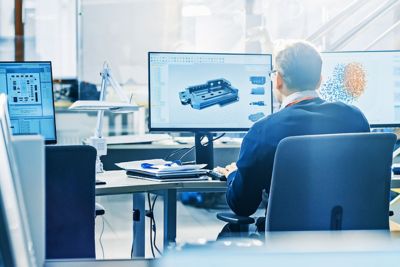-
United States -
United Kingdom -
India -
France -
Deutschland -
Italia -
日本 -
대한민국 -
中国 -
台灣
-
Ansys는 학생들에게 시뮬레이션 엔지니어링 소프트웨어를 무료로 제공함으로써 오늘날의 학생들의 성장을 지속적으로 지원하고 있습니다.
-
Ansys는 학생들에게 시뮬레이션 엔지니어링 소프트웨어를 무료로 제공함으로써 오늘날의 학생들의 성장을 지속적으로 지원하고 있습니다.
-
Ansys는 학생들에게 시뮬레이션 엔지니어링 소프트웨어를 무료로 제공함으로써 오늘날의 학생들의 성장을 지속적으로 지원하고 있습니다.
ANSYS BLOG
July 19, 2022
Ansys and Rolls-Royce Streamline Eco Design Phase for Aerospace
The threat of climate change is growing more serious by the day. Industries and companies are increasingly responding by finding ways to reduce their carbon footprint and prioritize sustainability.
Commercial aviation accounts for approximately 2-3% of global carbon emissions. Aerospace manufacturers are setting targets to reduce emissions — such as Rolls-Royce’s commitment to reach net-zero by 2030 for their own operations — enabling the sector players to reach net-zero by 2050.
Eighty percent of product life costs in the aerospace industry are locked in at the concept design phase, when materials and manufacturing decisions are made, and the efficiency of the overall system is revealed. That’s why it is critical to integrate eco design processes during this phase, ensuring the embodied energy and CO2 associated with materials and their manufacturing are identified and optimized so that the final product can be understood in terms of its sustainable impact with minimal time or cost constraints.

The Project to Lead Eco-design Integration with Aerospace Development and Engineering Systems (PLEIADES) is a major effort to increase sustainability in the aerospace industry. Coordinated by Ansys and sponsored by Rolls-Royce PLC, PLEIADES addresses the topic of “industry-focused eco design,” which sits within the Engines Integrative Technology Demonstrator (ITD) CleanSky2 program. The project developed a workflow to include the environmental assessments of materials and manufacturing processes of aerospace products at the concept design phase so that manufacturers can produce more sustainable products in a timely manner.
The PLEIADES project has four main objectives:
- Combine engineering, environmental, sustainability, and business considerations, which are all applicable to the selection of materials and processes in design workflows.
- Integrate and use available primary and secondary environmental data throughout the process.
- Ensure better consistency, interoperability, and understanding of uncertainty across different levels of the life cycle analysis (LCA).
- Integrate with engineering workflows to enable practical eco design.

Evaluating Environmental and Sustainability Impacts
Over four years, from August 2016 to December 2020, the Ansys Materials team analyzed, developed, and tested a workflow for industrial eco design to evaluate the environmental and sustainability impacts of aircraft components during the concept design phase. Rolls-Royce provided in-house specifications, material, and process data that were stored in the Ansys Granta MI Enterprise materials information management software suite. Granta MI Enterprise, using the Restricted Substances module, enables bills of materials to be screened against regulations for restricted substances, critical materials, and social responsibility aspects of conflict materials. In addition, the assignment of material and process data stemming from MaterialUniverse includes information such as CO2, energy manufacturing waste, and water impacts which sits alongside the technical performance data enabling eco design processes. Ansys used MaterialUniverse, a dataset containing more than 4,000 commercially available materials, to map reference data to Rolls-Royce specifications. MaterialUniverse contains technical, cost, and environmental data and wider sustainability information, which is key to making informed material and process selection and substitution decisions as early as possible in the design process. Using this readily available reference data, engineers evaluated technical performance and environmental impact, reducing the time to assign environmental data to complex designs by an estimated 10X to 100X.

“Rolls-Royce was very pleased with the work produced by the Ansys-led consortium as part of the CleanSky 2 PLEIADES program to build a solution for integrating eco design best practices within aerospace engineering workflows," says Amandeep Singh Mhay, Engineering Specialist of Materials Data at Rolls-Royce. “Delivering key environmental, regulatory and engineering metrics and materials traceability is increasingly more important. The tools and methods designed through the PLEIADES program integrate with Ansys Granta’s existing comprehensive materials database to provide much needed additional sustainability assessment. Using this approach, engineers and designers are able to make better decisions and ensure sustainability is a baked-in consideration.”
A More Sustainable Future for the Aerospace Industry
Automating and standardizing the environmental data process in the aerospace industry is a complex process, especially from an end-user perspective, and there is still a long way to go. Ansys supports the sustainable future of the aerospace industry by providing a process that not only speeds up design decision-making, but also enables manufacturers to push sustainability efforts within their organizations, ultimately driving the business and the industry toward a better future.
Click here or here to learn more about the PLEIADES project, or watch the video here.










